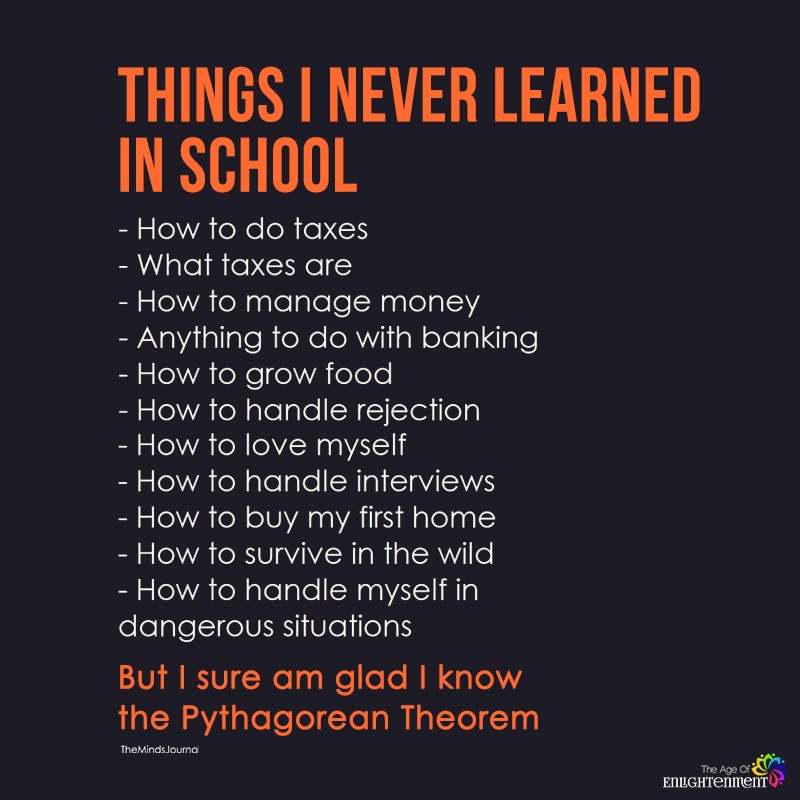Life Lessons Not Taught in School
“Education is what remains after one has forgotten what one has learned in school.” -Albert Einstein
School is supposed to help children grow into wise, conscious human beings, by providing them with the tools needed to live a beautiful, fulfilling life.
The way school works in most places around the world, however, is far from teaching children those lessons that are essential to living this kind of life.
Here are 10 such life lessons not taught in school, although they are of true importance and which every person should know.

1. Knowledge doesn’t equal understanding
One of the most harmful things we were taught in school is that to know about things means to actually understand them. Hence most of us didn’t learn to develop our critical thinking and base our reasoning on our own experiences and understanding of things.
Instead, we’ve learned to believe what has been handed down to us from tradition, without stopping and questioning whether what we know is true or not, which is preventing us from learning and evolving into wiser individuals.
Related: 8 Simple Lessons That People Take A Lifetime To Learn
2. Titles won’t make you feel significant
From a very young age, children are being fooled to believe that acquiring a college or university degree will make them feel significant and proud of themselves, no matter how much suppression they will have to endure.
The truth, however, is that degrees and titles are never enough to make us feel significant since they cannot provide us with what we truly long for — empowering things like creative work, meaningful relationships, and inner peace. Titles can only provide us with temporary egoistic pleasure, but eventually, they will always leave us empty and insecure.
3. Failure can be a good thing
Most people, when they were school students, were in constant fear of failure. Students are taught that failure is a bad thing that everybody should be scared of and that in life we need to avoid failure by all means, as if it is some sort of an evil thing. But since mistakes and failure are actually what teach us right from wrong, being afraid of making mistakes can prevent us from trying to achieve new things, which can only stunt our personal development.
Related: 4 Things I Wish I Had Been Taught In School
4. Doing nothing is not a waste of time
When a child doesn’t feel like doing anything productive but feels like relaxing, contemplating, or playing, its parents and teachers say that this is just a waste of time. Hence children learn from a very young age that leisure time is meaningless and futile and that being continuously busy and productive is what gives purpose and meaning in life, which is causing them a lot of stress, usually resulting in mental and emotional fatigue, and all sorts of psychosomatic illnesses. Taking time off to relax and do nothing can help us enjoy the present moment, recharge our batteries, reconsider our way of living, and focus on what is important in life.
Related: Mental Health Benefits Of Boredom
5. Boredom is a healthy sign
In modern society, we think that boredom is a bad thing and those who are bored have nothing better to do in life. The truth, however, is that boredom is nothing more than a symptom of suppression. As school students, most of us were forced to attend class, and naturally, we were bored and lazy since we didn’t derive any joy from it.
When, however, we were given the time to play or do something creative that essentially allowed us to express our mind and heart, we were always filled with energy, being active with the totality of our being. Boredom, therefore, is a healthy sign showing that one is still a sensitive human being who wishes to pursue his or her passions.
Related video:
6. Work can be fun
In school, children are taught that they have to sacrifice their time and effort, suppressing themselves for years upon years in order to get a good degree so they can later find a decent job and earn a living. Therefore they have associated in their minds work with suppression and sacrifice.
One of the essential life lessons that children are not taught in school though is that work can actually be absolutely beautiful if done with love. Work can be one of the most blissful experiences if it sprouts spontaneously from our mind and heart. When, however, work is being done out of compulsion — because we have to do it — it becomes a mere drudgery.
7. Competition is not beneficial
From the moment children enter school, they are taught that competition is healthy and that it helps them learn better, thus school imbues them with the belief that competition contributes to our progress, both on an individual and collective level. Studies, however, have shown that when children collaborate, they learn more easily than when they compete.
In addition, studies have shown that co-operation helps workers to be more creative, proving that, when it comes to creativity, the belief that competition is beneficial is just a myth. In, fact, competition and the war mentality that we see all around us has done a lot to stunt the progress of human civilization and contribute immensely to the everyday stress and violence that prevails in modern societies around the world.
Related: 7 Life Lessons We Can Learn From The 14th Dalai Lama
8. Exams don’t measure intelligence
In school, children’s knowledge and understanding is being tested by exams. School students who are doing well in exams are usually being looked up to by their teachers and those ones who don’t do well are looked down upon. This gives students the wrong impression that exams are a sufficient measure of their intelligence. The reality though is that exams, as we know them to exist today in most schools across the world, are far from measuring the intelligence of children. School exams are actually nothing more than memory tests which, in order for students to pass, they just have to memorize and regurgitate information, which they will most likely soon forget altogether once they graduate from school.
Related: This Viral Intelligence Test Separates the Fakes from the Real Geniuses – Can You Solve It?
9. Money can’t buy happiness
The reason children are being given for going to school is that by doing so they will manage at some point later in their life to earn plenty of money that will allow them to live a good, happy life. Therefore children come to believe that money should be the primary goal in life, and that it is the main thing that will bring them happiness and success. And although in our economic system it is true that money is needed to buy us food and shelter, it is never enough to buy us happiness. Happiness, as research shows, is mainly derived from healthy relationships with people and is almost entirely unrelated to money, once our basic physical needs are satisfied.
10. Non-conformity is a good thing
Every person is unique, without exception. Yet since we were very young, we have been taught that we should conform to society, follow rules, and walk on a ready-made path created by others. This is particularly done in school, were children have to obey to the authority of their teachers, as well as accept and believe what they are being taught by them. All the great minds that have walked on Earth, however, chose to not conform, but doubt belief, doubt authority, and think for themselves. The way of non-conformity is certainly not an easy way to follow, but it is the only way to live a truly free and fulfilled life.
“A child educated only at school is an uneducated child.” ~George Santayana
Written by Sofo Archon
This article was originally published on Unbounded Spirit.











Leave a Reply